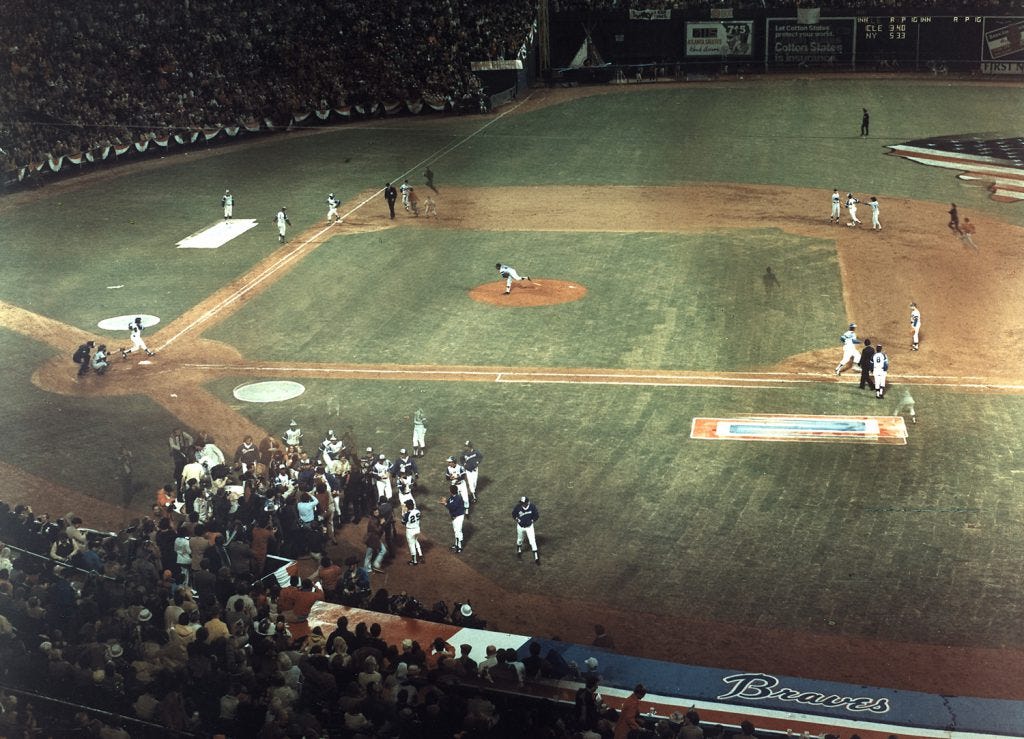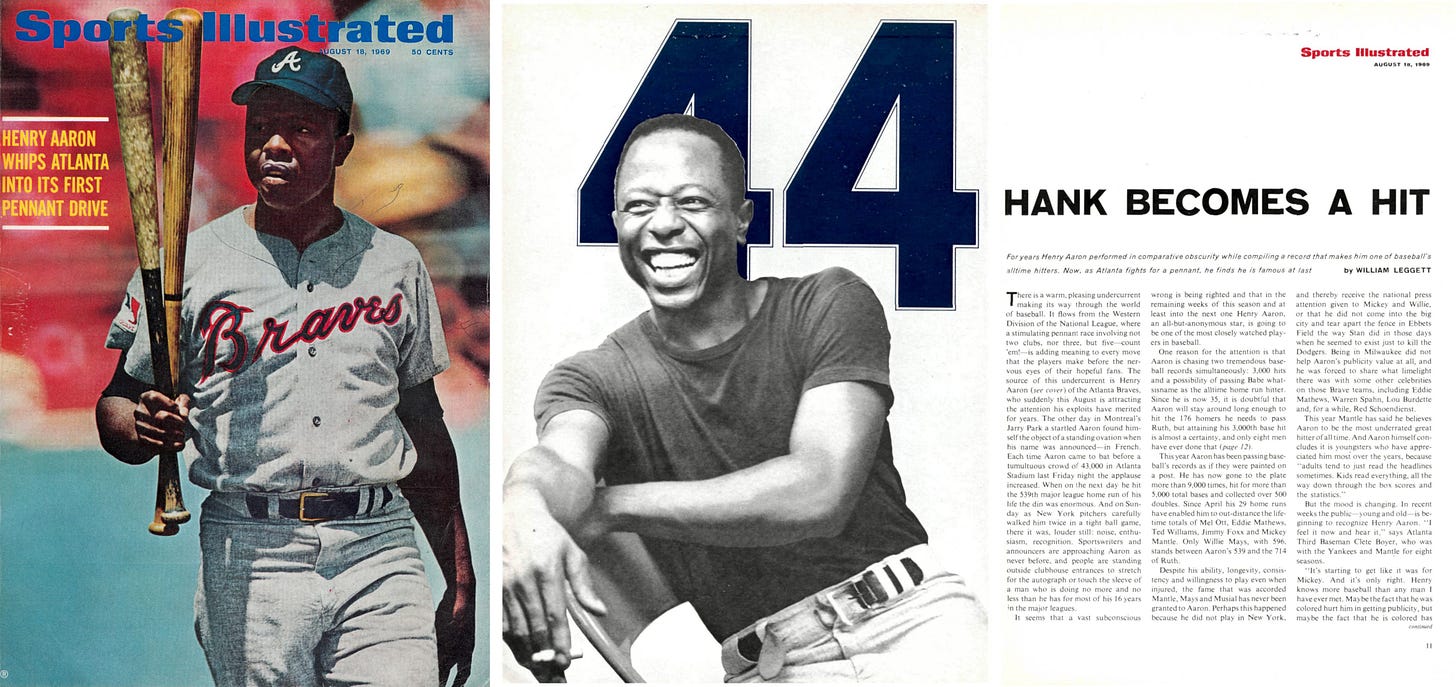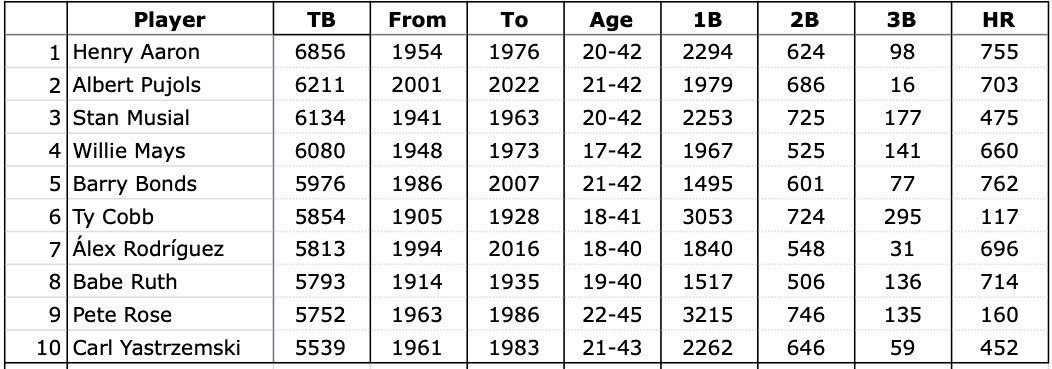There’s nothing more life-affirming than diving headlong into a pop culture rabbit hole.
My adulthood has been a series of scratching the surface of a THING (garage rock, 1950s monster movies, late-night TV Horror Hosts, Frankenstein, Tiki drinks, baseball), then digging deeper to where that thin vein opens into a massive chasm. And there you find thousands of garage rock bands, oodles of local TV Horror Hosts, so many versions of Frankenstein, etc. You’ll also find like-minded folks who are into that same THING. The process is manna from heaven for the easily obsessed.
This post is one such instance. I’ve been digging around this particular thing for so long, I can’t remember how it started, but it’s ending here, with FIVE songs about Henry Aaron, all released in 1974.
First let’s talk about Hammerin’ Hank himself. He preferred Henry, so we’ll call him Henry. Everyone knows the skinny kid from Mobile in the 1950s. And the portly slugger of the 1970s. But our focus is on Henry Aaron in his prime, in the era that tickles our fancy more than any other, the 1960s. Look at the smile on his face.
From an August 1969 Sports Illustrated cover story, by William Leggett, it’s clear that the setter of records, the future home run king, was remarkably underrated.
There is a warm, pleasing undercurrent making its way through the world of baseball… Henry Aaron of the Atlanta Braves, who suddenly this August is attracting the attention his exploits have merited for years. The other day in Montreal's Jarry Park, a startled Aaron found himself the object of a standing ovation when his name was announced— in French. Each time Aaron came to bat before a tumultuous crowd of 43,000 in Atlanta Stadium last Friday night the applause increased. When on the next day he hit the 539th major league home run* of his life, the din was enormous… Sportswriters and announcers are approaching Aaron as never before, and people are standing outside clubhouse entrances to stretch for the autograph or touch the sleeve of a man who is doing no more and no less than he has for most of his 16 years in the major leagues.
[*At the time, only Willie Mays, at 596 home runs, stood between Aaron and Ruth at 714.]
It seems that avast subconscious wrong is being righted and that in the remaining weeks of this season, and at least into the next one, Henry Aaron, an all-but-anonymous star, is going to be one of the most closely watched players in baseball.
One reason for the attention is that Aaron is chasing two tremendous baseball records simultaneously: 3,000 hits and a possibility of passing Babe whatsisname as the all-time home run hitter. Since he is now 35, it is doubtful that Aaron will stay around long enough to hit the 176 homers he needs to pass Ruth [EDITOR’S NOTE: ha!], but attaining his 3,000th base hit is almost a certainty, and only eight men have ever done that…
"When I came into baseball I had a taste for it in my mouth and that has never changed,” said Aaron. “Often the fans don't realize what a player must go through and how tired he can get. But the fan is the one who pays his money, and he expects to receive the best for it. He goes to games to see people like Sandy Koufax pitch and Maury Wills steal bases; to see Willie Mays make the basket catch and Henry Aaron hit. When I don't hit, I feel bad about it because the fans might feel cheated. It bothers you if you are a professional."
That big-hearted empathy was a consistent motif that carried through Aaron’s career as a player and later as an Atlanta Braves executive. Henry Aaron cared. No matter the racist vitriol. No matter the circumstance.
It took until April 1974 for Henry to hit his record home run, it was a phenomenon years in the making. The home run watch was on. Can he do it? When will he do it?
The first of our five singles cheers on Aaron to #715. “Do It Henry” by the Daughters.
The Daughters band appears to be a one-time studio affair, but damn, this slab of funk slaps hard. Headphones on. Speakers up.
“Do It Henry” was co-written and co-produced by Terry Phillips for Pickwick International (home to Ray Charles, Jerry Lee Lewis, Perez Prado, and Kool & The Gang). Phillips produced records for a couple decades, but his most endearing claim to fame might be this: in 1964 he tasked Pickwick staff songwriter Lou Reed to write and perform a potential dance-craze “The Ostrich.” The song never went anywhere, but a session player on that track was John Cale. Within a few years, Reed and Cale would form The Velvet Underground, providing Phillips his greatest success. So without Terry Phillips, there is no Velvet Underground. And, in a way, without the Velvet Underground, there is no “Do It Henry.”
Our next track is from The Blast Furnace Band (and The Grapevine Singers), “Hammering Hank, Part 1.”
Another funk groove that locks in and does not let you go. Singer-songwriter Sam Dees is behind this track and plays a smooth soul singer/ play-by-play announcer imagining Henry’s 715th. I wish baseball broadcasts actually sound like this.
Track three is from a more household name, blues legend Willie Dixon. “That Last Home Run” is credited to Willie Dixon’s Chicago Blues All Stars, with McKinley Mitchell taking the lead vocals.
The single was originally released on Dixon’s own label, Yambo Records within a month of Henry’s 715. Another great groove, this one surprises with bombastic game sound effects. The B-side, “All Star Bougee” (Boogie?) is a piano-pounder instrumental that sounds like a post-game celebration waiting to happen.
Now we turn to ball players singing about Henry.
Nelson Briles was a solid swingman/pitcher in the 1960s & 1970s. He collected World Series rings with the 1967 Cardinals, the 1971 Pirates, and the 1979 Pirates (as a broadcaster). Briles came from a musical family, his twin brothers touring and performing throughout California during his playing days. Briles himself performed often during his career, including singing the National Anthem for game 4 of the 1973 World Series (in which his team didn’t appear). Briles even made a quick cameo on Saturday Night Live, alongside Bill Murray and Garrett Morris (as Chico Escuela) in the “Baseball has been berry, berry good to me” skit.
Briles released this single, “Hey Hank” on Capitol Records in early 1974.
It falls solidly in the novelty song genre, but still pretty fun. The chorus tells you all you need to know.
Hey Hank, I know you’re gonna do it
but please don’t hit it off of me.
Hey Hank, I gotta reputation and I’ve got a family,
so please don’t hit it, please don’t hit it,
please don’t hit it off of of me.
Briles’ plea was warranted. Aaron faced him 73 times with a .373/.411/.731 slash line, six home runs, and a 1.142 OPS.
Our final Henry Aaron song is the laidback pop confection, “Move Over Babe (Here comes Henry).” This one is an AM radio exemplar, just enough country, just enough soul.
The music was composed by cup-of-coffee pitcher Bill Slayback (-0.1 WAR in 48 appearances) and the lyrics were written by Detroit Tigers broadcaster Ernie Harwell. Yes, the same Ernie Harwell from our Roy Scheider double feature. Harwell wrote and sold over 60 songs to various artists, including Homer & Jethro, B.J. Thomas, Johnny Mercer, and Mitch Ryder. This is news to even the most ardent baseball/record nerd, as none of these compositions topped the charts. ”Needless to say, I have more no-hitters than Nolan Ryan,” Harwell quipped in 2005.
“Move Over Babe” was the product of longtime Detroit soul producer Ollie McLaughlin and released twice on sister labels (Karen Records and Carla Records, named after Laughlin’s daughters). The first version had vocals by Slayback; the second version had vocals by Richard “Popcorn” Wylie.
Hot take: the superior version belongs to “Popcorn.”
I love these five singles inspired by the great man and his home run chase. Much of the coverage of this period of Aaron’s life focuses on the racist attacks he suffered. My intention is not to trivialize that part of the story, but add to it by highlighting those who chose to sing, smile, and celebrate him.
Aaron played through 1976 and left many, many statistical fun facts. One of the most eye-popping, and oft-cited, is that even if you removed his 755 career homers, he would still have more than 3,000 hits.
But the number I’m going to leave you with is a record that might be his most untouchable: Total Bases. A player earns one total base for a single, two for a double, etc. Here’s the chart of the all-time leaders.
Henry Aaron sits atop the list of baseball immortals. Second place goes to recently retired Albert Pujols, an impressive spot to land for “The Machine.” Except for this: if Pujols decided to return to baseball to catch Henry Aaron, and he miraculously hit 161 home runs in his first 161 plate appearances… he would still be in second place to The Hammer.
To find active players on this list, you have to scroll all the way down to Nelson Cruz at 113th (3847 total bases) and Joey Votto at 133rd (3706 total bases). Those are great players, with long careers. And they’ve barely cracked HALF of Henry’s total bases.
Henry’s 6,865 looks positively other-worldly now. And like the man himself, in a class all his own.









This is SO fun! Ernie Harwell- who knew? Would've been interesting to be in on Capitol Records' green-lighting of Briles' tune.
Thanks for the lead on some new music! Hammering Hank is so catchy!